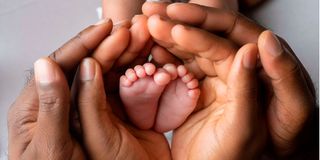Premium
I desire to adopt a child, how do I go about it?

Section 186 of the Children’s Act avows that the court can grant an adoption order to a sole applicant who is not below 25 years and not above 65.
Eric,
I long to have a child of my own, but since I am incapable, I have decided to adopt one. Unfortunately, I have no idea where to begin. Help me.
Understanding the adoption process within the framework of the Children’s Act of 2022 is sufficient. It should be noted that realisation of this law has been a long tedious consultative journey among state and non-state agencies working in the legal and children rights’ space in pursuance to the best interest of the child principle as espoused at Article 53 of the Constitution. In this regard, the leadership and instrumentality of the National Council on Administration of Justice (NCAJ) cannot be gainsaid.
Adoption is the process of placing a child permanently with a legal parent or parents as described at Part XIV of the Children’s Act (2022). Section 3 of this Part categorises adoption into three forms: local, kinship and foreign. Kinship adoption as provided for at Section 2 of the Act, is placing a child with a person related to them.
The term kinship is derived from the relationship, mostly biological between the child and the potential adopter. Local adoption is the placement of a Kenyan child with adopters who are Kenyan nationals and resident in the country, while foreign adoption has a quadrilateral application as follows: first is the placement of a child with a legal parent or parents who hold dual citizenship that of Kenya and another a second country.
Second, is the placement to adopters who are foreign nationals, and do not necessarily reside in Kenya. Thirdly, is placement to adopters who are not Kenyan nationals but are biologically related to the child: and fourth, the adopting parent or parents were once Kenyan nationals but have lost their nationality by operation of the law of the host country to which the prospective parent or parents have a nationality.
Part XIV at Section 183 gives details to what an adoption process entails, therefore, anyone seeking to adopt a child in this country must move the court through an application requesting for authority to follow through such an adoption. The court will have confirmed that the application has the relevant support material, especially it being written on the prescribed form, and the child meeting the criteria stated at Section 185 of Part XIV, besides the applicant fitting the qualification threshold as provided for at Section 186.
An applicant for adoption must first ascertain their own qualification and that of the child to be adopted. The parameters for both are prescribed at Section 184 of Part XIV of the Children’s Act. This includes the following: that the child has attained the age of six weeks and declared free by the National Council for Children’s Services whose broad mandate is to advise the Cabinet Secretary on matters relating to child protection and the central authority an all matters to do with adoption amongst other functions, that the person, including a parent, guardian or adoption society, shall not, prior to the making of an adoption order, entrust a child to the care, possession or control of any person not qualified to adopt a child in accordance with the Act: an applicant shall not preselect a prospective adoptive child except in the case of kinship adoption and where the applicant is a foster parent seeking to adopt a fostered child under the applicant’s care, the Secretary shall monitor and submit reports to the courts on the wellbeing of a child who is subject to adoption proceedings. Within the application, there must be written consent from a parent or guardian of the child, or any person who is liable by virtue of any order or agreement to contribute to the maintenance of the child and on the application of one of the spouses, the consent of the other spouse: similarly, from the child if such child has attained the age of 10.
There are two other facts to consider regarding the applicant and the child to be adopted. Section 186 of the Children’s Act avows that the court can grant an adoption order to a sole applicant who is not below 25 years and not above 65. If the applicant is male, such an applicant must be the blood relative of the child.
The court can also grant it to two spouses jointly for as long they are married to each other and both or one of them is 21 years older than the child to be adopted. Where the court grants an adoption order to anyone above the age of 65, it will be based on a written report of the special circumstances meriting such a decision. Otherwise, persons of unsound mind as defined in the frames of the Mental Health Amendment Act (2022), incapable of exercising proper care and guardianship of a child, having been convicted of sexually related offences besides robbery with violence amongst other offences as stated at Schedule III of the Children’s Act.
Eric Mukoya has over 17 years’ experience working in the social justice sector. He’s the executive director of Undugu Society of Kenya. Legal query? Email [email protected]





